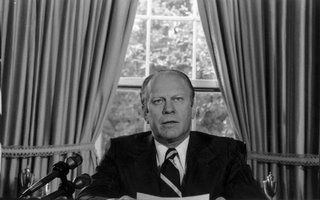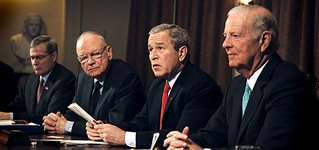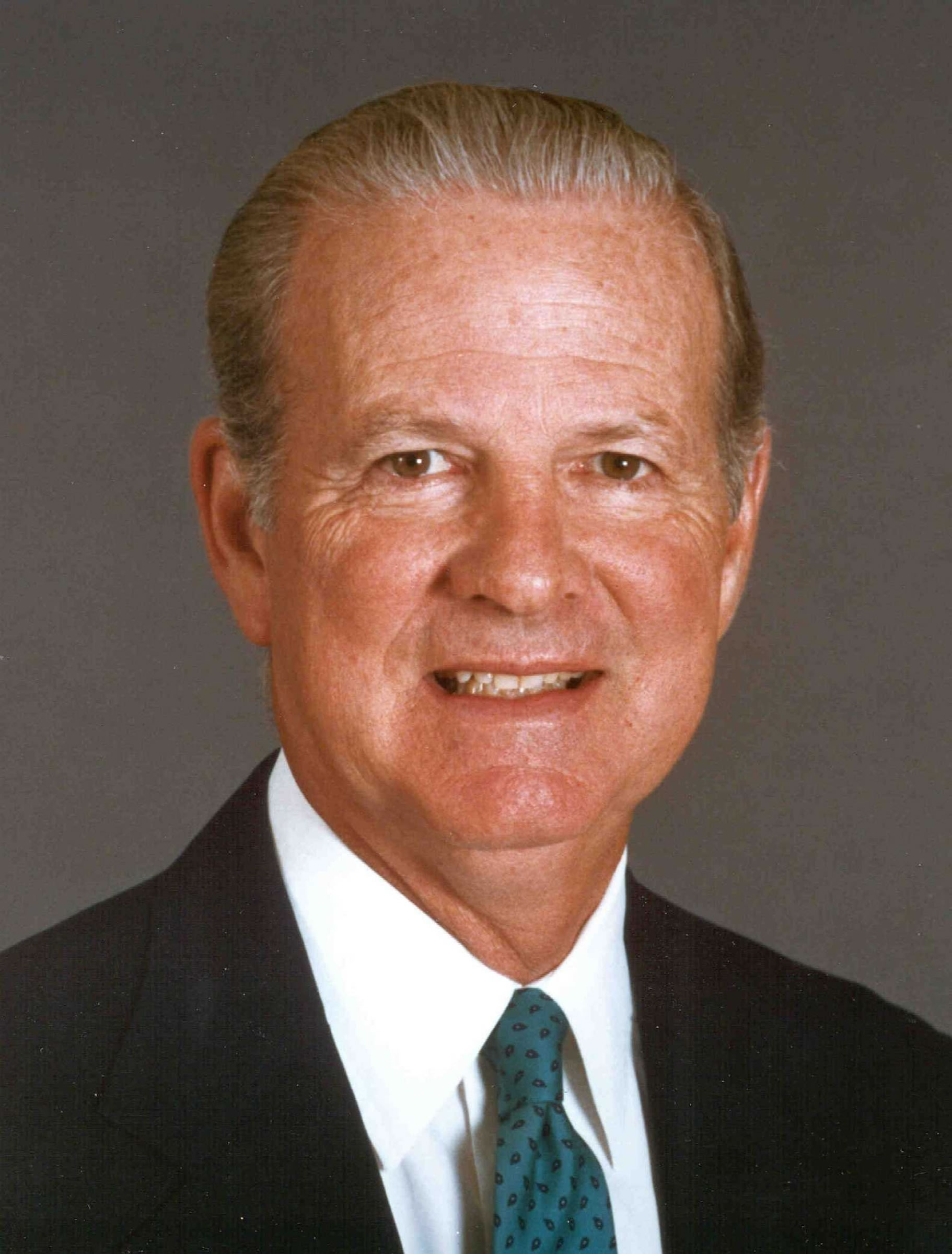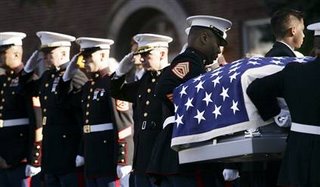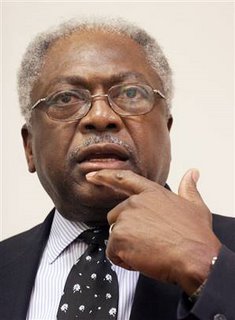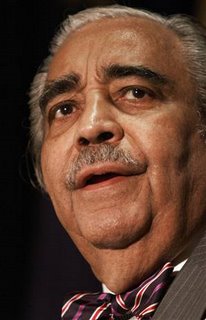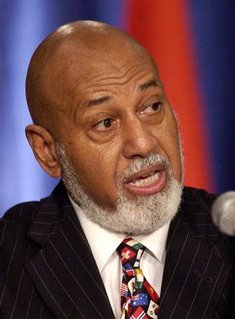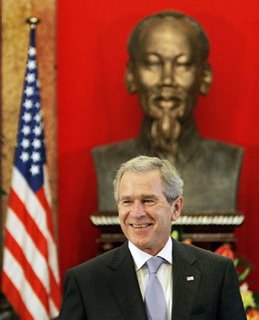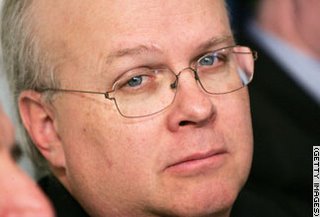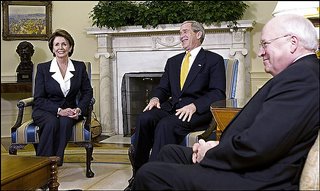Less musically than the Trapp Family Singers or the Kia crew, we're also saying some farewells, particularly to a year that, twisting a phrase in Latin made by Queen Elizabeth II some years back, was sure one horrible anus.
In no particular order of derision, then, joyful goodbyes to:
Donald Rumsfeld, the father of all ideologically-driven secretaries of defense. Were you one of the biggest obstacles to a clear-eyed foreign policy concerning Iraq? Were you needlessly divisive and polarizing? Are we glad as hell you’re gone? You bet.
Saddam Hussein: You found out the hard way that there is no god but God, and that don’t include you. Time to go lord it over the minions of the underworld. You're all done; don't let the gates of hell hit you in the ass on your way in.
Slobodan Milosevic: You earned your nickname, the Butcher of the Balkans. More than 200,000 people died as you cultivated old Serbian animosities into a decade-long civil war. And then you had nerve enough to die during your own war-crimes trial in The Hague – the ultimate escape from justice. In this world, anyway.
Augusto Pinochet: More than 3,000 human beings disappeared under your regime in Chile, after you overthrew a democratically-elected government. Thank you, at long last, for doing the same.
 Tom DeLay: You’re now free to pursue other meaningful employment in the private sector. Perhaps a return to your former line of work in the pest control business is in order.
Tom DeLay: You’re now free to pursue other meaningful employment in the private sector. Perhaps a return to your former line of work in the pest control business is in order.George Allen: You at least had the grace not to contest the election that bounced you out of office. Relax, take the Trent Lott road to contrition and maybe we’ll hear from you in a year or three, you macaca, you.
Karl Rove: There’s your math and there’s The Math. Your class in Remedial Political Arithmetic 101 starts when the new Congress does. Don’t cut class.
Bode Miller: The poster boy for Olympic athletic excess. America’s presumptive golden boy at the February Games in Torino, he entered five events and didn’t medal in a single one. Interviewed by Newsweek’s Devin Gordon, Miller apparently didn’t really want to compete at the Games. Note to Bode: Next time you don’t give a damn, don’t show up.
Michael Richards: Anonymity – and the millions you’ll earn forever from your share of the “Seinfeld” fortune – has to be better than a standup career that needs the N-word. We’ve heard Lenny Bruce, and you’re no Lenny Bruce.
Kenneth Lay: We were surprised to hear you died in Aspen of the effects of a bad heart; thousands of Enron employees doubted you even had one.
James Frey: Let’s get it straight. There’s a fiction shelf for books and a nonfiction shelf for books. It’s that way for a reason. Failure to understand that has a way of shattering a reputation into, well, a million little pieces.
Mike Nifong: The Duke lacrosse-team rape case was a sorry way to build your career as a prosecutor. But cheer up -- with the charges of ethics violations you’re facing, you’ve got a promising career ahead of you as a K Street lobbyist, evangelical minister or a Republican congressman. What a great country.
Bill Frist: The Tennessee senator and stock trading enthusiast wisely stepped out of politics and ended speculation on taking a run for the big chair in 2008. We’re guessing that maybe he's gone back into private medical practice. Good move -- you can’t heal the patient when you’re part of the disease.
 Others aren’t leaving the scene but we wish to God they were:
Others aren’t leaving the scene but we wish to God they were:Paris Hilton: Shut up. Just shut up.
Britney Spears: Shut up. Please shut up. And buy some underwear.
Bill O’Reilly and Ann Coulter: Shut the fuck up.
O.J. Simpson, Pamela Anderson and K-Fed: Jesus, are you still here?
The word “truthiness”: All respect to Stephen Colbert, but this isn’t the contribution to the American lexicon he’s been led to believe it is. If truthiness means the politic blurring of fact and fiction, there must be lots of other suitable words that already exist. Hell, you’ll find most of ‘em in James Frey’s book.
There are other goodbyes we’d rather not be saying at all. With tears, all props & much love, we kiss goodbye to:
Robert Altman: Our favorite maverick of the movies. In a body of work that stretched from the ‘50s up to the work in progress he was developing before he died, Altman insisted on doing it his way, raising hell every step of the way.
 Syd Barrett: Singer-songwriter, guitarist, cracked founding genius of Pink Floyd: Remember when you were young, you shone like the sun. Shine on you crazy diamond. Now there's a look in your eyes, like black holes in the sky. Shine on you crazy diamond. You were caught on the crossfire of childhood and stardom, blown on the steel breeze. Come on you target for faraway laughter, come on you stranger, you legend, you martyr, and shine!
Syd Barrett: Singer-songwriter, guitarist, cracked founding genius of Pink Floyd: Remember when you were young, you shone like the sun. Shine on you crazy diamond. Now there's a look in your eyes, like black holes in the sky. Shine on you crazy diamond. You were caught on the crossfire of childhood and stardom, blown on the steel breeze. Come on you target for faraway laughter, come on you stranger, you legend, you martyr, and shine! Ed Bradley: He was tough, he was smart, he was cool, he was elegant, he was streetwise and no man in the history of television ever looked as good with an earring and a beard. Bradley broke racial barriers at CBS News in particular and in journalism in general, creating a powerful body of work in his quarter-century on “60 Minutes.” When he died on Nov. 9 of leukemia at Mount Sinai hospital in New York City at the age of 65, his friend Jimmy Buffett told him that the New York Knicks and the Democrats had both won. Bradley smiled, shortly before letting go of this life -- a life that won't be the same without him.
Ed Bradley: He was tough, he was smart, he was cool, he was elegant, he was streetwise and no man in the history of television ever looked as good with an earring and a beard. Bradley broke racial barriers at CBS News in particular and in journalism in general, creating a powerful body of work in his quarter-century on “60 Minutes.” When he died on Nov. 9 of leukemia at Mount Sinai hospital in New York City at the age of 65, his friend Jimmy Buffett told him that the New York Knicks and the Democrats had both won. Bradley smiled, shortly before letting go of this life -- a life that won't be the same without him. Gerald Boyd: Another trailblazer for journalists of darker hue, Gerry Boyd, a former managing editor of The New York Times, died on Nov. 23, of lung cancer. Boyd had the experience of too many black and brown journalists in this country: being The First. He was the first black metropolitan editor and managing editor at The Times. At 28, he was also the youngest journalist picked for a Nieman Fellowship at Harvard. But his firstness helped a lot of people become one of many in a business that still has too few.
Gerald Boyd: Another trailblazer for journalists of darker hue, Gerry Boyd, a former managing editor of The New York Times, died on Nov. 23, of lung cancer. Boyd had the experience of too many black and brown journalists in this country: being The First. He was the first black metropolitan editor and managing editor at The Times. At 28, he was also the youngest journalist picked for a Nieman Fellowship at Harvard. But his firstness helped a lot of people become one of many in a business that still has too few.Ahmet Ertegun: The Turk who favored bespoke suits and rock and roll, a founder of both Atlantic Records and the Rock and Roll Hall of Fame, died Dec. 14 after head injuries from a fall he took backstage during the Rolling Stones concert at President Bill Clinton's 60th birthday party at New York's Beacon Theatre in October. A native of Turkey, he had the ears for music we wish we had, seeking out the talents of talents from Clyde McPhatter, the Coasters, Solomon Burke and Aretha Franklin to Ray Charles, Led Zeppelin and the Rolling Stones. Our friend and former colleague Jon Pareles of The New York Times said it best: “[H]e was an outsider who had become something more than an insider, an American phenomenon who proved the best way to cross boundaries was with the promise of a good time.”
Buck O’Neil: He was a two-time Negro Leagues batting champion, baseball scout, war veteran, manager of the Kansas City Monarchs, the first black coach in the major leagues. But most Americans alive today remember John Jordan O'Neil as the gentle, folksy paterfamilias of Ken Burns' 1994 documentary "Baseball." In February 2006, it was thought O’Neil was headed for the Baseball Hall of Fame. But the game he loved -- or the sportswriters who only wrote about the game he loved -- stiffed him. A special 12-person committee commissioned to render final judgments on Negro Leagues and pre-Negro league figures did not vote him into Cooperstown. Buck was a class to the end: “Shed no tears for Buck,” he told friends that day. not going into the Hall of Fame, that ain’t going to hurt me that much, no. Before, I wouldn’t even have a chance. But this time I had that chance.” Was there a classier act in the game?
Samuel James Archibald: He was just Sam to hundreds of journalism students (including your humble narrator). The former political reporter and congressional aide who helped craft the landmark Freedom of Information Act of 1966. After 10 years of reporting on politics for The Sacramento Bee, Archibald joined the staff of newly elected Democratic Rep. John Moss of California. Angered by federal bureaucrats' refusals to release names of citizens fired for allegedly being communists, Moss formed a subcommittee that looked into government secrecy and made Archibald staff director. Archibald is credited with writing the original one-paragraph draft that stated -- with a simple elegance that has terrified bureaucrats ever since -- that all government information must be free and available to the public. After numerous exceptions and qualifications were added during an 11-year battle for enactment, during which Archibald served as ramrod, the measure became law in 1966. If you've ever read a government report since then, you can thank Sam Archibald for trying to make sure what's in it isn't truthiness, but truth.
Mal Deans: Malcolm "Mal" Deans, the only senior instructor emeritus at the University of Colorado School of Journalism, brought a scrappy, wise demeanor to the practice of teaching journalism. The School's student-produced newspaper, the Campus Press, dates back to when Deans created it so that CU journalism students could get hands-on experience. He also established a program that allowed seniors to work at local newspapers. It was Mal Deans who put in a good word for me with the brain trust at the Boulder Daily Camera in 1979, right before I graduated. Next thing I knew, I had my first job in journalism waiting for me before I graduated. You hear talk of guardian angels; mine had a fondness for scrapple, small talk and faith in skinny undergrads who loved the written word -- and who, thanks to him, still do.
Michael Britten: Friend, fellow writer and tireless fan of the blues and other music, Michael wrote reviews for Salon and other publications, investing his pieces with flair and insight. He gifted me with music I'd never heard before, and seemed to have an almost encyclopedic knowledge of that music, knowledge he shared generously and with a good humor that belied the relentless progression of the multiple sclerosis that ultimately took him.
There were others, of course. Gordon Parks. Ann Richards. Wilson Pickett. Bebe Moore Campbell. … and of course a celestial shout-out is due for Moms, Wilhelmina Sherman Ross, mother of all mothers, who crossed over the wide water this year and whom we love like our next breath, and miss terribly. There’s no pain like that loss, no emptiness you can imagine that matches the vacancy of self that emerges when your mother dies. It is another kind of darkness visible.
 “It is easy to see the beginnings of things, and harder to see the ends.” wrote Joan Didion, in her essay “Goodbye to All That,” chronicling another kind of departure -- one of passion and spirit for a place. It is no stretch to suggest that, with the year about to expire as evidence, it is easier to embrace a year's beginnings, its intrinsic possibilities, than to cope with its tired, slouching ends. It's a matter of dealing with unexpected disillusionment arriving in unexpected ways.
“It is easy to see the beginnings of things, and harder to see the ends.” wrote Joan Didion, in her essay “Goodbye to All That,” chronicling another kind of departure -- one of passion and spirit for a place. It is no stretch to suggest that, with the year about to expire as evidence, it is easier to embrace a year's beginnings, its intrinsic possibilities, than to cope with its tired, slouching ends. It's a matter of dealing with unexpected disillusionment arriving in unexpected ways.Now, bidding farewell to a year of anything but magical thinking (Didion’s memoir a notable exception), we feel much the same. There are things we’ll miss, situations we wish we’d handled better, faces and smiles we wish we’d acknowledged when we had the chance. But mostly, ours is a wistfulness best savored not in front of us but looking through the rear-view mirror, everything we’d like to forget receding fast in the dusty distance, objects not closer than they actually appear --
Eyes on the road ahead, now, hands on the wheel, the fireworks, new faces and noisemakers dead ahead.
They’re dropping the ball at midnight, and when it falls, it’s in our court.
Let's get it started.
-----
Image credits: Tom DeLay: U.S. Congress (public domain); Syd Barrett: Flupe.com; Ed Bradley: CBS News; Gerald Boyd: photographer unknown




